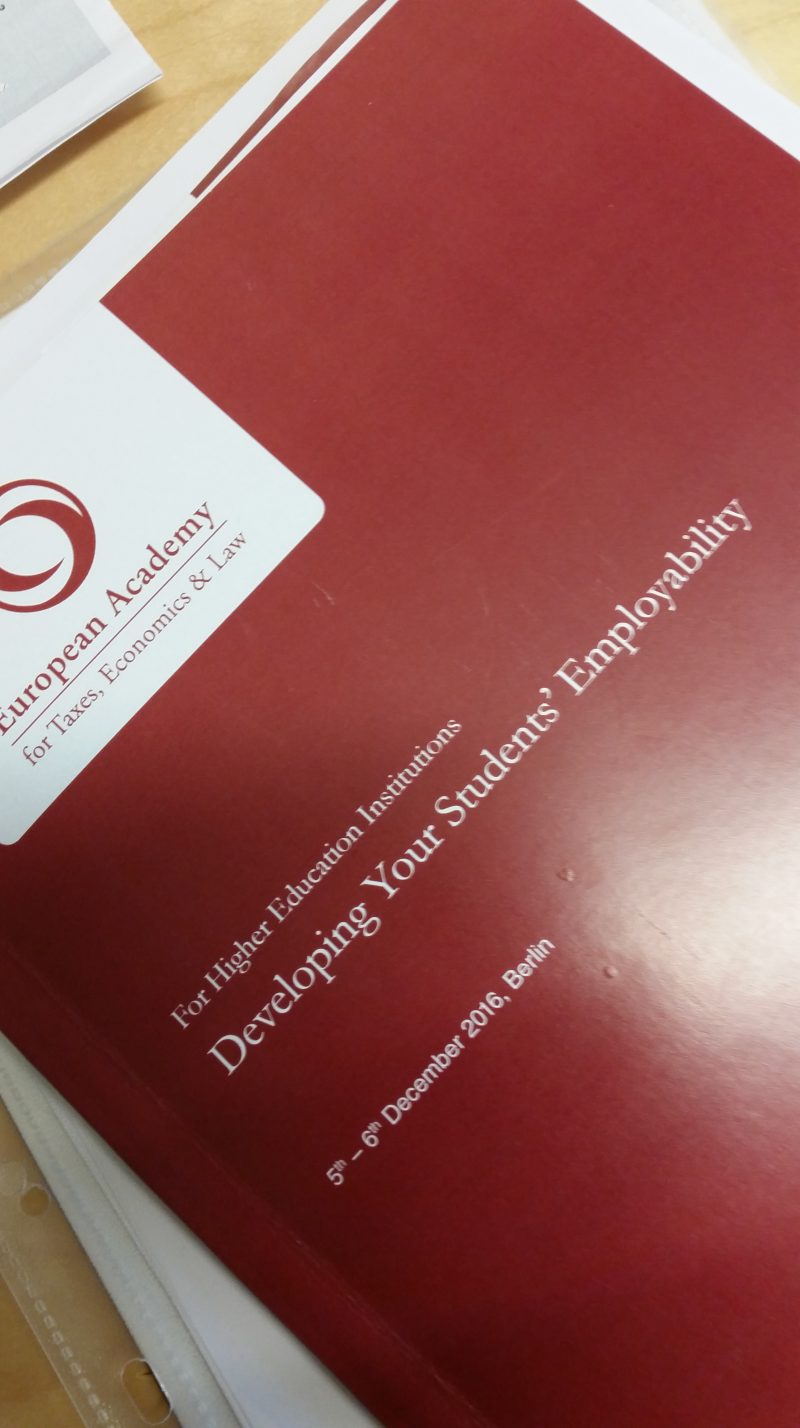Career is everybody’s business….
Emma Hägg, Career Programme Manager, participated in staff training at European Academy in Berlin December 5-6.
A diverse group of participants from Holland, UK, Switzerland, South Africa, Denmark, Sweden, Lithuania and Italy met up in a chilly Berlin to attend the European Academy’s two day programme on the topic “Developing student’s employability”.
United Kingdom in the lead
First presenter and Chair Keith Herrmann from University of Surrey (UK) presented the context and key differentiators for career services with a focus on the United Kingdom. UK is in many ways in the fore front in Europe when it comes to career development for students.
National league tables where employability is an important factor are essential for the leaderships at the universities in UK, as they are competing for students. Parents are to a greater part choosing universities based on if their children will get jobs. Surveys following up on students after graduating are central and there is a strong connection to the Alumni Offices in this aspect. The data and metrics from career activities and follow up surveys are important for communicating both internally as well as externally the importance career services’ work play in graduates’ entry to the job market.
CRM – helpful technology
One way of handling metrics and also coordinating contacts both internally and externally is through a customer relations management system (CRM). One session focused on a Swiss example. Mark Kühne Director of Career Center University in St Gallen, shared best practice from when they built and implemented their own CRM together with their Alumni Office. Now (a few years down the road) they have a great platform for students, companies and alumni to access services and to network. Still there is development to be done and you need to offer unique services on the platform in order to keep the users active.
Amber Wigmore Alvarez at the IE Business School also addressed the importance of adopting new technology when presenting the impressive development and work of her unit. She also stressed the importance of communicating your efforts and results. Thi makes all parts of the university aware of your work and value, also the students. Also in being creative and innovative in the offer of career services, using technology, you can catch the student’s attention and they are more likely to get engaged.
Award them to engage them
Student engagement was touched upon many times during these two days. Naomi Oosman Watts from Newcastle University presented a nice example in a session on how the trend of “skill awards” is spreading among British universities. Awards are a way of catching students attention and engaging them in career activities that will be beneficial for them when entering the job market. Newcastle presented and interesting example of an award for extracurricular activities. The Newcastle Award encourages students to articulate their skills and make use of their extracurricular activities during studies for their future graduate careers. Their award consists of 50 hours extracurricular activities of almost any kind and two workshops. The first workshop focus on goal setting and the practicalities related to the award. They must set three personal goals for themselves. The second workshop focus on the articulation of skills preparing for the assessment where they define three skills they have developed during their participation in the award. Even though employers do not recognize the award as such they value the employability skills that the students have gained from the award. The award concept fuels student engagement and is an interesting alternative to regular career courses as it is sometimes difficult to fit these into the curriculum.
Irith Kist, Project Manager Dual Career/Dutch Olympic committee, put us participants in the shoes of our own students for a while sharing some of her career planning workshop exercises. This was was very interesting and made us better understand the difficulties our students sometimes are struggling with. Engagement is not always for fun. Setting goals and verbalizing your thoughts and dreams are also difficult.
Unite for career
All in all career is something that is or at least should be everybody’s business at the university! If we look at the “circle of the student”, beginning with the prospective student – registered student – graduate and finally alumni – the alumni in the world of work is in fact inspiring a new prospective student! An inspiring career is the successful outcome of education and unarguably that is definetly everybodys business at the university…
Collaborating more within the university and with employers, with the future careers of our students in mind should be what we all strive for – because career is everybody’s business!
Emma
International Coordinator with a great interest for communications and a talent for project management. Employed by Karolinska Institutet since 2004.




0 comments